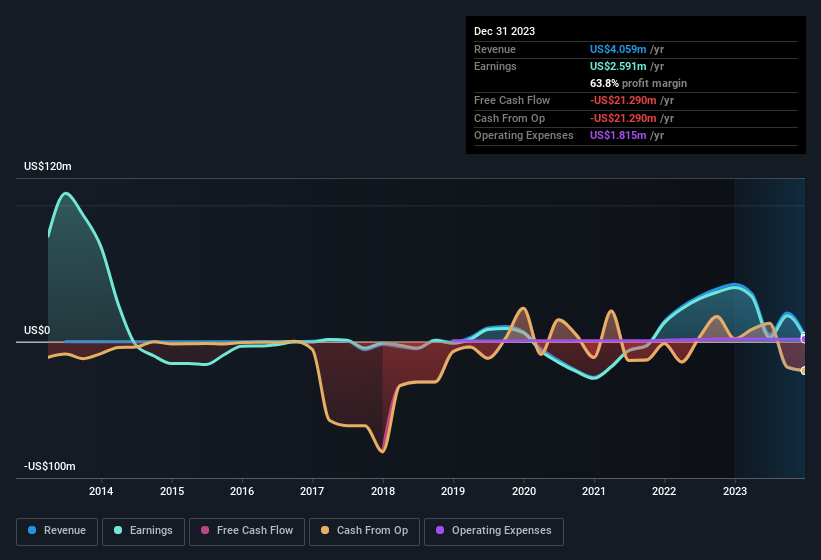- Norway
- /
- Energy Services
- /
- OB:SDSD
S.D. Standard ETC's (OB:SDSD) Sluggish Earnings Might Be Just The Beginning Of Its Problems
The subdued market reaction suggests that S.D. Standard ETC Plc's (OB:SDSD) recent earnings didn't contain any surprises. However, we believe that investors should be aware of some underlying factors which may be of concern.
Check out our latest analysis for S.D. Standard ETC

Examining Cashflow Against S.D. Standard ETC's Earnings
In high finance, the key ratio used to measure how well a company converts reported profits into free cash flow (FCF) is the accrual ratio (from cashflow). The accrual ratio subtracts the FCF from the profit for a given period, and divides the result by the average operating assets of the company over that time. This ratio tells us how much of a company's profit is not backed by free cashflow.
That means a negative accrual ratio is a good thing, because it shows that the company is bringing in more free cash flow than its profit would suggest. While having an accrual ratio above zero is of little concern, we do think it's worth noting when a company has a relatively high accrual ratio. To quote a 2014 paper by Lewellen and Resutek, "firms with higher accruals tend to be less profitable in the future".
S.D. Standard ETC has an accrual ratio of 0.26 for the year to December 2023. Unfortunately, that means its free cash flow fell significantly short of its reported profits. Even though it reported a profit of US$2.59m, a look at free cash flow indicates it actually burnt through US$21m in the last year. We saw that FCF was US$2.1m a year ago though, so S.D. Standard ETC has at least been able to generate positive FCF in the past.
Note: we always recommend investors check balance sheet strength. Click here to be taken to our balance sheet analysis of S.D. Standard ETC.
Our Take On S.D. Standard ETC's Profit Performance
S.D. Standard ETC didn't convert much of its profit to free cash flow in the last year, which some investors may consider rather suboptimal. Therefore, it seems possible to us that S.D. Standard ETC's true underlying earnings power is actually less than its statutory profit. Sadly, its EPS was down over the last twelve months. The goal of this article has been to assess how well we can rely on the statutory earnings to reflect the company's potential, but there is plenty more to consider. If you'd like to know more about S.D. Standard ETC as a business, it's important to be aware of any risks it's facing. For example, S.D. Standard ETC has 4 warning signs (and 1 which doesn't sit too well with us) we think you should know about.
This note has only looked at a single factor that sheds light on the nature of S.D. Standard ETC's profit. But there is always more to discover if you are capable of focussing your mind on minutiae. Some people consider a high return on equity to be a good sign of a quality business. So you may wish to see this free collection of companies boasting high return on equity, or this list of stocks that insiders are buying.
New: Manage All Your Stock Portfolios in One Place
We've created the ultimate portfolio companion for stock investors, and it's free.
• Connect an unlimited number of Portfolios and see your total in one currency
• Be alerted to new Warning Signs or Risks via email or mobile
• Track the Fair Value of your stocks
Have feedback on this article? Concerned about the content? Get in touch with us directly. Alternatively, email editorial-team (at) simplywallst.com.
This article by Simply Wall St is general in nature. We provide commentary based on historical data and analyst forecasts only using an unbiased methodology and our articles are not intended to be financial advice. It does not constitute a recommendation to buy or sell any stock, and does not take account of your objectives, or your financial situation. We aim to bring you long-term focused analysis driven by fundamental data. Note that our analysis may not factor in the latest price-sensitive company announcements or qualitative material. Simply Wall St has no position in any stocks mentioned.
About OB:SDSD
S.D. Standard ETC
An investment holding company, focuses on energy, transport, and commodities segments.
Flawless balance sheet and good value.
Market Insights
Community Narratives




